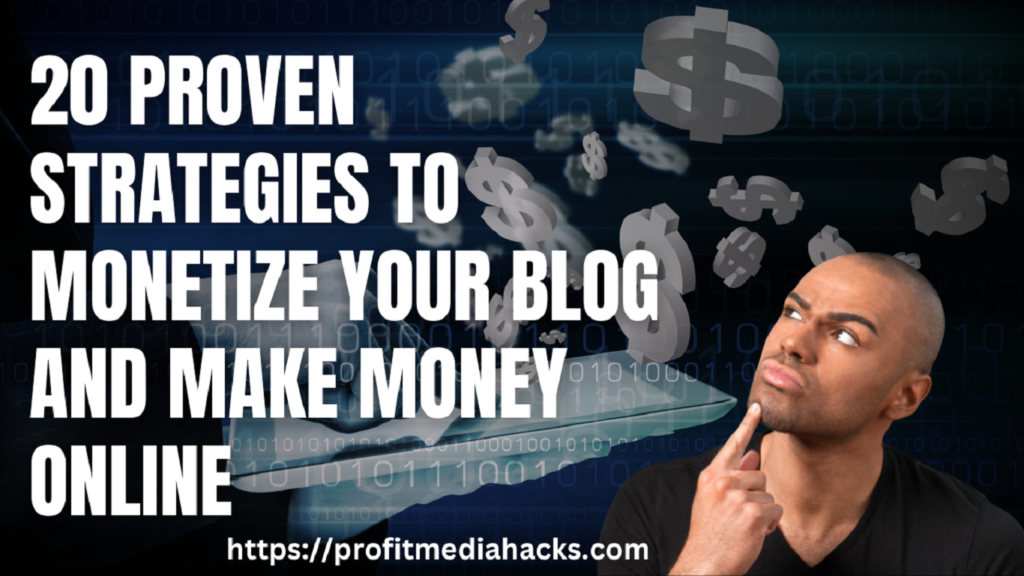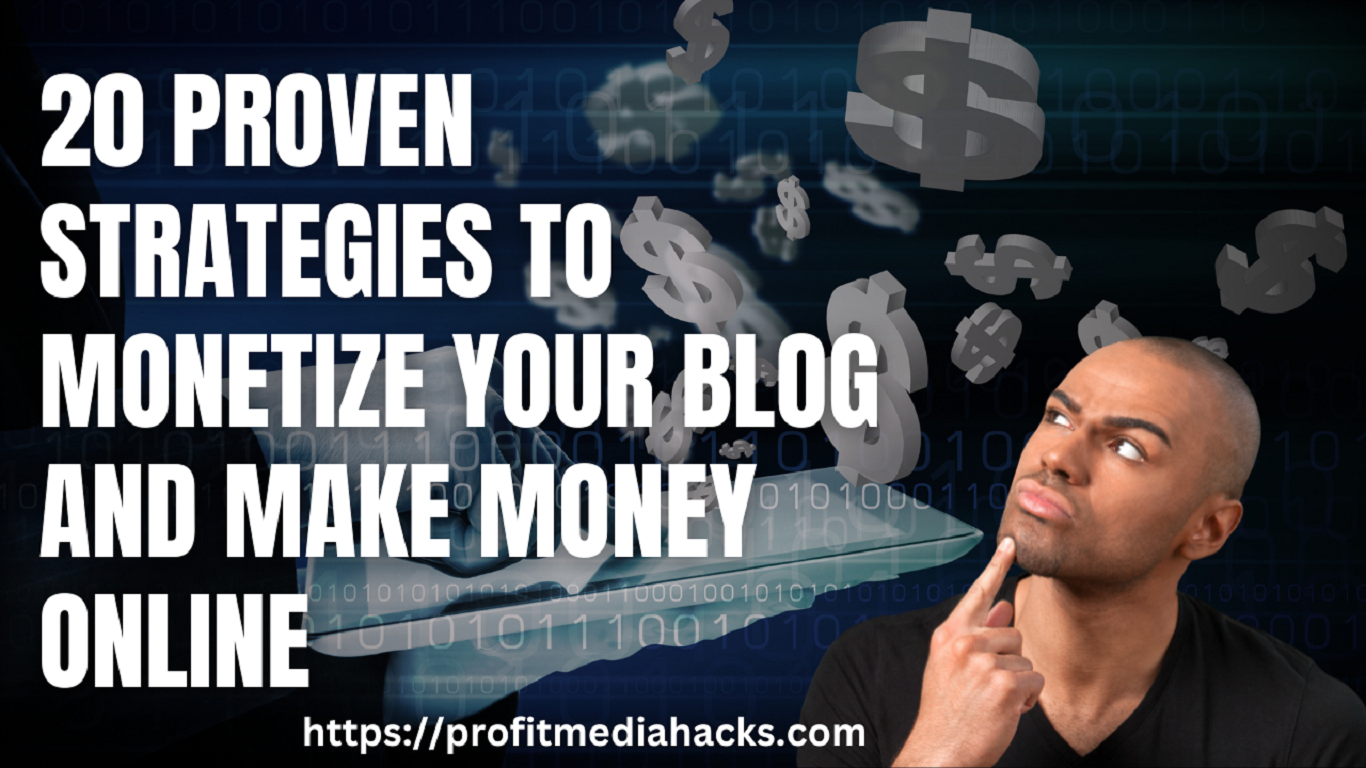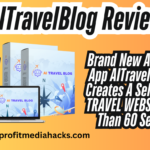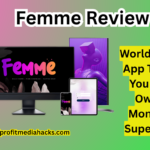Blogging has become more than just a hobby—it’s a viable way to make money online. Whether you’re a seasoned blogger or just starting out, monetizing your blog can open up numerous opportunities for generating income. In this comprehensive guide, we’ll explore 20 proven strategies to help you monetize your blog effectively and start earning money from your passion.
Easiest & Proven Way to Make $100 Daily with 0 COST – Watch THIS FREE Training to START >>

Affiliate Marketing
Overview
Affiliate marketing is a popular monetization method where bloggers earn a commission for promoting products or services. By partnering with affiliate programs relevant to your niche, you can recommend products to your audience and earn a commission for every sale made through your unique affiliate link.
Choosing the right products
Selecting the right products to promote is crucial for success in affiliate marketing. Focus on products that align with your blog’s niche and are likely to appeal to your audience. Conduct thorough research to ensure the products are of high quality and offer value to your readers.
Integrating affiliate links strategically
To maximize your affiliate earnings, integrate affiliate links strategically within your blog content. Write genuine product reviews, create tutorials demonstrating how to use the products, and incorporate affiliate links naturally into your blog posts. Avoid over-promotion and prioritize providing valuable content to your audience.
Sponsored Content
Understanding sponsored content
Sponsored content involves collaborating with brands or companies to create content that promotes their products or services. This can include sponsored blog posts, social media posts, videos, or product placements. Sponsored content allows bloggers to monetize their platform while providing exposure to brands.
Finding sponsored opportunities
To find sponsored opportunities, reach out to brands directly or join influencer marketing platforms that connect bloggers with brands seeking sponsored collaborations. Build a strong online presence, demonstrate your expertise in your niche, and showcase your engagement metrics to attract potential sponsors.
Negotiating rates
When negotiating sponsored content deals, consider factors such as your audience size, engagement rate, and the scope of work involved. Price your sponsored content appropriately based on your reach and the value you can provide to the brand. Be transparent about your rates and deliverables to avoid misunderstandings.
Display Advertising
Types of display ads
Display ads come in various formats, including banner ads, sidebar ads, and pop-up ads. These ads are placed strategically throughout your blog and generate revenue based on impressions (CPM) or clicks (CPC). Google AdSense is one of the most popular ad networks for bloggers.
Implementing display ads effectively
Place display ads in prominent locations where they are visible to your audience without being intrusive. Experiment with different ad sizes and formats to find what works best for your blog layout. Optimize your ad placements to maximize clicks and revenue without compromising user experience.
Easiest & Proven Way to Make $100 Daily with 0 COST – Watch THIS FREE Training to START >>
Optimizing ad placements
Monitor the performance of your display ads regularly and make adjustments as needed to optimize your earnings. Test different ad placements, colors, and designs to increase ad visibility and click-through rates. Strike a balance between monetization and user experience to maintain reader engagement.
Selling Digital Products
Creating digital products
Digital products such as ebooks, online courses, templates, and digital downloads can be lucrative revenue streams for bloggers. Leverage your expertise and knowledge to create valuable digital products that address the needs and pain points of your audience.
Platforms for selling digital products
Choose the right platform to sell your digital products based on your niche, audience demographics, and product type. Popular platforms for selling digital products include Gumroad, Teachable, Podia, and Shopify. Consider factors such as pricing, payment processing, and marketing features when selecting a platform.
Promoting digital products
Promote your digital products through your blog, email list, social media channels, and other marketing channels. Create compelling sales pages that highlight the benefits of your digital products and incentivize readers to make a purchase. Offer discounts, bonuses, or limited-time offers to encourage conversions.
Offering Services
Identifying marketable skills
Identify marketable skills or expertise that you can offer as services to your audience. Whether it’s consulting, coaching, design, writing, or virtual assistance, leverage your skills to provide valuable services that solve problems or fulfill needs within your niche.
Setting up service offerings
Define your service offerings clearly and package them in a way that appeals to your target audience. Determine your pricing structure, deliverables, and terms of service upfront to streamline the client onboarding process. Create a professional services page on your blog to showcase your offerings and attract potential clients.
Marketing services on your blog
Promote your services on your blog through dedicated service pages, blog posts, banners, or pop-ups. Showcase your expertise and experience through case studies, client testimonials, and portfolio samples. Use persuasive language and calls-to-action to encourage readers to inquire about your services.
Membership Sites
Building a membership site
A membership site allows you to offer exclusive content, resources, or community access to paying members. Create a membership site on your blog using platforms like MemberPress, Teachable, or WordPress plugins like Paid Memberships Pro. Determine the membership tiers, pricing plans, and benefits offered to members.
Creating exclusive content
Provide exclusive content or resources to your members that aren’t available to the public. This could include premium articles, video tutorials, downloadable resources, or member-only forums. Continuously update and add value to your membership site to retain existing members and attract new ones.
Pricing strategies
Set competitive pricing for your membership tiers based on the value provided and the expectations of your target audience. Offer multiple pricing plans with varying benefits to cater to different member preferences and budgets. Experiment with free trials, discounts, or limited-time offers to incentivize membership sign-ups.
Sponsored Reviews
Writing sponsored reviews ethically
When writing sponsored reviews, maintain transparency and integrity by disclosing any sponsored relationships or partnerships with brands. Provide honest and unbiased reviews of the products or services, highlighting both their strengths and weaknesses. Ensure that your reviews align with your audience’s interests and preferences.
Building credibility with your audience
Build trust and credibility with your audience by delivering authentic and reliable reviews that prioritize their interests. Avoid promoting products or services solely for financial gain and prioritize recommending products that genuinely benefit your audience. Engage with your audience and address their questions or concerns about the reviewed products.
Negotiating terms with brands
When negotiating sponsored review deals, clarify expectations, deliverables, and compensation with the sponsoring brands upfront. Ensure that both parties are aligned on the scope of work, deadlines, and any additional requirements. Negotiate fair compensation based on your audience reach, influence, and the effort required to create the review.
Email Marketing
Building an email list
An email list is a valuable asset for bloggers to nurture relationships with their audience and drive conversions. Offer incentives such as lead magnets, freebies, or exclusive content to encourage visitors to subscribe to your email list. Use opt-in forms, pop-ups, or landing pages to capture email addresses effectively.
Easiest & Proven Way to Make $100 Daily with 0 COST – Watch THIS FREE Training to START >>
Creating valuable content for subscribers
Deliver valuable content to your email subscribers regularly to keep them engaged and interested in your blog. Send personalized newsletters, updates, exclusive offers, or behind-the-scenes insights that provide value and encourage interaction. Segment your email list based on subscriber preferences or behavior to deliver targeted content.
Monetizing through email campaigns
Monetize your email list by promoting affiliate products, digital products, services, or sponsored content directly to your subscribers. Craft compelling email campaigns that align with your audience’s interests and offer solutions to their pain points. Track the performance of your email campaigns and optimize them for better results over time.
Podcasting
Starting a podcast
Podcasting is a popular medium for bloggers to reach a wider audience and monetize their content. Choose a niche or topic that aligns with your blog’s audience and interests, and invest in quality podcasting equipment and hosting platforms. Plan your podcast episodes, format, and release schedule to maintain consistency.
Monetizing through sponsorships and ads
Monetize your podcast through sponsorships, advertising, or listener donations. Partner with brands or advertisers relevant to your podcast’s niche and audience demographics. Incorporate sponsored segments, ad reads, or pre-roll/post-roll ads into your podcast episodes to generate revenue.
Promoting products or services within episodes
Promote your own products, services, or affiliate offers within your podcast episodes to monetize your audience directly. Create sponsored content or product mentions that seamlessly integrate with your podcast’s content and provide value to your listeners. Include clear calls-to-action and links in your podcast show notes to drive conversions.
Webinars and Workshops
Hosting webinars and workshops
Hosting webinars and workshops is an effective way to engage with your audience, demonstrate your expertise, and generate revenue. Choose topics that resonate with your audience’s interests and pain points, and promote your events through your blog, email list, and social media channels.
Charging for attendance
Monetize your webinars and workshops by charging attendees for access to the live event or recording. Offer early bird pricing, discounts, or bundled packages to incentivize registrations. Provide valuable content, actionable insights, and interactive Q&A sessions to deliver a memorable experience for attendees.
Leveraging recorded sessions
Maximize the value of your webinars and workshops by repurposing the recorded sessions into digital products or bonus content. Offer the recordings as on-demand replays, downloadable resources, or part of a membership site. Continuously promote and sell access to the recorded sessions to generate ongoing revenue.
Consulting and Coaching
Offering consulting services
Consulting and coaching are lucrative opportunities for bloggers to leverage their expertise and provide personalized guidance to clients. Identify areas where you can offer valuable advice, insights, or solutions to your clients’ challenges within your niche.
Establishing expertise in your niche
Position yourself as an authority in your niche by showcasing your knowledge, experience, and success stories. Create content that demonstrates your expertise, such as blog posts, case studies, or client testimonials. Engage with your audience and address their questions or concerns to build credibility and trust.
Pricing consultancy services
Set competitive pricing for your consultancy services based on the value you provide, your level of expertise, and the market demand. Offer different consulting packages or pricing tiers to cater to different client needs and budgets. Clearly communicate your pricing structure and deliverables to potential clients to streamline the booking process.
Ebooks and Online Courses
Writing ebooks or creating online courses
Ebooks and online courses are scalable digital products that allow bloggers to monetize their expertise and knowledge. Choose a topic or subject that aligns with your blog’s niche and audience interests, and create comprehensive, high-quality content.
Marketing and selling ebooks/courses
Market your ebooks and online courses through your blog, email list, social media, and other marketing channels. Create compelling sales pages that highlight the benefits and features of your products. Offer bonuses, discounts, or limited-time offers to incentivize purchases and drive conversions.
Updating content to increase sales
Regularly update and improve your ebooks and online courses to keep them relevant and valuable to your audience. Incorporate feedback from customers, update outdated information, and add new content or modules as needed. Continuously promote and market your products to attract new customers and increase sales.
Crowdfunding
Launching a crowdfunding campaign
Crowdfunding platforms like Kickstarter, Indiegogo, or Patreon offer bloggers the opportunity to raise funds for creative projects or business ventures. Create a compelling campaign pitch that outlines your project, goals, and rewards for backers. Set a realistic funding target and promote your campaign to your audience and beyond.
Offering rewards to backers
Incentivize backers to support your crowdfunding campaign by offering exclusive rewards, perks, or early access to your project. Create reward tiers with varying benefits to appeal to different levels of backers. Fulfill your promises and deliver rewards promptly to maintain trust and satisfaction among your backers.
Engaging with backers throughout the campaign
Stay engaged with your backers throughout the crowdfunding campaign by providing regular updates, behind-the-scenes insights, and interactive content. Respond promptly to backer questions, comments, and feedback to foster a sense of community and involvement. Express gratitude and appreciation for the support received from your backers.
Donations and Tips
Setting up donation options
Provide donation options on your blog to allow readers and supporters to contribute financially to your work. Set up donation buttons or links using platforms like PayPal, Ko-fi, or Buy Me a Coffee. Clearly communicate the purpose of donations and how they will support your blog’s growth and sustainability.
Encouraging support from your audience
Encourage your audience to support your blog through donations or tips by highlighting the value of your content and the impact of their contributions. Express appreciation for any support received and recognize donors publicly to foster a sense of community and belonging.
Showing appreciation for donations
Show gratitude and appreciation for donations received by sending personalized thank-you messages, shoutouts, or exclusive perks to donors. Keep donors updated on how their contributions are being used to improve your blog or fund specific projects. Cultivate a culture of generosity and reciprocity within your community to encourage ongoing support.
Conclusion
Monetizing your blog requires creativity, dedication, and strategic planning. By implementing these proven strategies, you can diversify your revenue streams, increase your earning potential, and turn your blog into a profitable online business. Experiment with different monetization methods, track your progress, and adapt your strategies based on your audience’s feedback and changing market trends. With persistence and perseverance, you can achieve financial success and fulfilment through your blogging journey.
FAQs
How long does it take to start making money from a blog?
The time it takes to monetize your blog depends on various factors such as your niche, content quality, audience size, and monetization strategies. Some bloggers may start earning within a few months, while others may take longer to see significant income.
Do I need a large audience to make money from my blog?
While having a large audience can certainly increase your earning potential, it’s not the only factor that determines success. Focus on building a loyal and engaged audience interested in your niche, and monetize strategically through multiple income streams.
Are there any costs involved in monetizing a blog?
Yes, there may be costs associated with running and monetizing a blog, such as domain and hosting fees, email marketing software, advertising expenses, and investment in digital products or services. However, many monetization methods can be implemented with minimal upfront costs.
How do I choose the right monetization methods for my blog?
Consider your blog’s niche, audience demographics, content format, and goals when choosing monetization methods. Experiment with different strategies, track their performance, and prioritise those that align with your audience’s interests and preferences.
Can I monetize my blog without compromising its integrity and authenticity?
Yes, it’s possible to monetize your blog ethically and authentically by prioritizing your audience’s interests and providing value through your content. Disclose any sponsored relationships or affiliate links transparently, and maintain honesty and integrity in your recommendations and promotions.
Easiest & Proven Way to Make $100 Daily with 0 COST – Watch THIS FREE Training to START >>
Thanks for reading my article on “20 Proven Strategies to Monetize Your Blog and Make Money Online.”” I hope it will help!













